英语虚拟语气的用法(精选)
虚拟语气用法归纳

虚拟语气用法归纳虚拟语气是一种特殊的语法形式,用来表示说话人所表达的事实并非真实的情况。
虚拟语气通常用于陈述某种假设、愿望、建议或推测。
在英语中,虚拟语气可以用于多种句型和场景中。
以下是关于虚拟语气的一些常见用法归纳:1. 条件句虚拟语气经常用于表示条件句中的不可能或未实现的情况。
在条件句中,主句和从句之间通常以if连接,其中的动词使用虚拟语气形式,即用过去式或过去完成式表示未来或现在的假设情况。
例如:"If I were you, I would go to bed early."(如果我是你,我会早点上床。
)2. 虚拟愿望虚拟语气还可以用于表达愿望或对现实情况的怀疑。
在这种情况下,常用的句型是"if only"或"would rather"等。
例如:"Ifonly I had more money, I would travel the world."(要是我有更多的钱,我就会周游世界。
)"I would rather you went with me."(我宁愿你和我一起去。
)3. 动词要求有些动词,如命令、建议、要求等,常常要求其后的从句使用虚拟语气。
这些动词包括:recommend(推荐)、insist(坚持)、demand(要求)、require(要求)、suggest(建议)等。
例如:"She insisted that he be on time for the meeting."(她坚持要求他准时参加会议。
)4. 形容词和名词后接从句有时,形容词或名词后接从句时,从句中的谓语动词要使用虚拟语气。
这种情况通常表示说话人对从句所表达的内容的怀疑或不同意。
例如:"It is important that he study hard for the exam."(他认真备考这个考试很重要。
(完整版)英语虚拟语气语法归纳总结
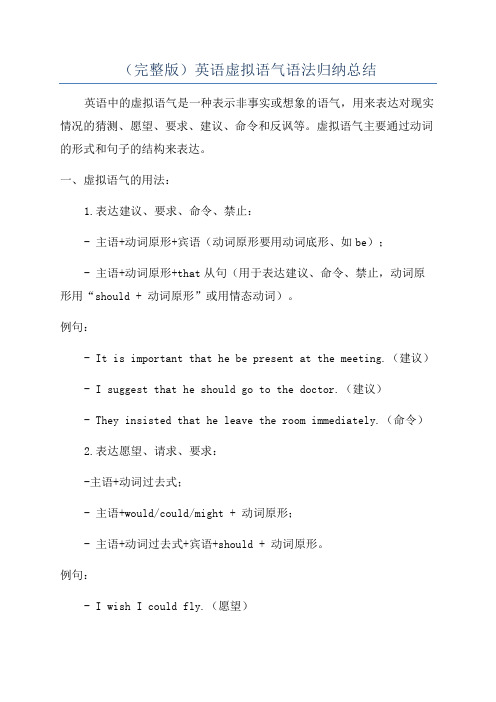
(完整版)英语虚拟语气语法归纳总结英语中的虚拟语气是一种表示非事实或想象的语气,用来表达对现实情况的猜测、愿望、要求、建议、命令和反讽等。
虚拟语气主要通过动词的形式和句子的结构来表达。
一、虚拟语气的用法:1.表达建议、要求、命令、禁止:- 主语+动词原形+宾语(动词原形要用动词底形、如be);- 主语+动词原形+that从句(用于表达建议、命令、禁止,动词原形用“should + 动词原形”或用情态动词)。
例句:- It is important that he be present at the meeting.(建议)- I suggest that he should go to the doctor.(建议)- They insisted that he leave the room immediately.(命令)2.表达愿望、请求、要求:-主语+动词过去式;- 主语+would/could/might + 动词原形;- 主语+动词过去式+宾语+should + 动词原形。
例句:- I wish I could fly.(愿望)- I would appreciate it if you could help me.(请求)3.表示虚拟条件:- If条件从句中的谓语动词用过去完成时,主句用would/should/might/could + have + 过去分词;- If条件从句中的谓语动词用过去时,主句用would/should/could + 动词原形。
例句:- If I had known his phone number, I would have called him.(虚拟条件)- If you had listened to me, we could have finished the project earlier.(虚拟条件)4.表达建议、要求、祝愿:- If only内部称述 + 主语 + 过去式。
虚拟语气的用法归纳

虚拟语气是一种特殊的动词形式,用来表达说话人的假设、愿望、猜测、建议等非现实的情况。
虚拟语气在英语中的使用非常广泛,包括情态动词、动词的过去式、过去完成时、be 型虚拟式等形式。
下面我将详细介绍虚拟语气的用法。
一、情态动词的虚拟语气1. 表示现在或将来的假设例如:If I had money, I would travel around the world.2. 表示过去的假设例如:If I had studied harder, I would have passed the exam.3. 表示与现在事实相反的愿望例如:I wish I were rich.4. 表示与过去事实相反的愿望例如:I wish I had studied harder.5. 表示与将来事实可能相反的愿望例如:I wish it would stop raining.二、动词的过去式的虚拟语气1. 表示现在或将来的假设例如:If I knew the answer, I would tell you.2. 表示过去的假设例如:If I had seen the movie, I would have recommended it to you.三、过去完成时的虚拟语气1. 表示过去的假设例如:If I had had more time, I would have finished the work.2. 表示与过去事实相反的愿望例如:I wish I had gone to the party last night.四、be型虚拟式1. 表示现在或将来的假设例如:If I were you, I would take the job.2. 表示与现在事实相反的愿望例如:I wish I were in Hawaii now.五、混合虚拟语气1. 表示过去的假设例如:If I had known that you were coming, I would have met you at the airport.2. 表示与过去事实相反的愿望例如:I wish I had studied harder and passed the exam.六、虚拟语气的特殊用法1. 在某些形容词后面使用虚拟语气例如:It is important that you be on time.2. 在某些名词后面使用虚拟语气例如:It is necessary that he study harder.3. 在某些介词后面使用虚拟语气例如:I am glad that you came.以上是虚拟语气的用法归纳,希望对大家有所帮助。
虚拟语气用法大全
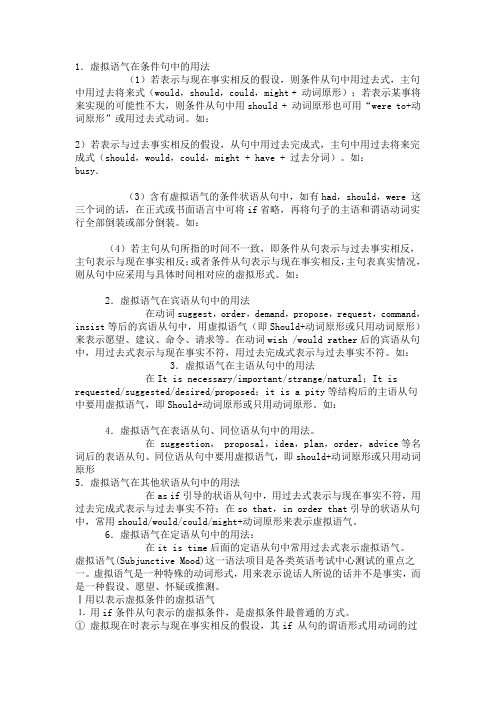
1.虚拟语气在条件句中的用法(1)若表示与现在事实相反的假设,则条件从句中用过去式,主句中用过去将来式(would,should,could,might + 动词原形);若表示某事将来实现的可能性不大,则条件从句中用should + 动词原形也可用“were to+动词原形”或用过去式动词。
如:2)若表示与过去事实相反的假设,从句中用过去完成式,主句中用过去将来完成式(should,would,could,might + have + 过去分词)。
如:busy.(3)含有虚拟语气的条件状语从句中,如有had,should,were 这三个词的话,在正式或书面语言中可将if省略,再将句子的主语和谓语动词实行全部倒装或部分倒装。
如:(4)若主句从句所指的时间不一致,即条件从句表示与过去事实相反,主句表示与现在事实相反;或者条件从句表示与现在事实相反,主句表真实情况,则从句中应采用与具体时间相对应的虚拟形式。
如:2.虚拟语气在宾语从句中的用法在动词suggest,order,demand,propose,request,command,insist等后的宾语从句中,用虚拟语气(即Should+动词原形或只用动词原形)来表示愿望、建议、命令、请求等。
在动词wish /would rather后的宾语从句中,用过去式表示与现在事实不符,用过去完成式表示与过去事实不符。
如:3.虚拟语气在主语从句中的用法在It is necessary/important/strange/natural;It is requested/suggested/desired/proposed;it is a pity等结构后的主语从句中要用虚拟语气,即Should+动词原形或只用动词原形。
如:4.虚拟语气在表语从句、同位语从句中的用法。
在 suggestion, proposal,idea,plan,order,advice等名词后的表语从句、同位语从句中要用虚拟语气,即should+动词原形或只用动词原形5.虚拟语气在其他状语从句中的用法在as if引导的状语从句中,用过去式表示与现在事实不符,用过去完成式表示与过去事实不符;在so that,in order that引导的状语从句中,常用should/would/could/might+动词原形来表示虚拟语气。
虚拟语气的用法归纳

虚拟语气的用法归纳虚拟语气是英语中一种特殊的句式,它用来表达与事实相反或与实际情况有差别的意思。
它可以帮助我们表达不同形式的否定、虚拟假设、条件、建议、建议等。
本文将对虚拟语气的用法进行归纳,以便更好地理解它。
一、虚拟语气的基本概念虚拟语气是一种特殊的句式,它表示“如果”的意思,即“假如”,“要是”,“如果”,“就好了”,“就像”,“就算”等。
它可以表达不同形式的否定、虚拟假设、条件、建议、建议等。
二、虚拟语气的使用1. 否定形式:如果不,要是不,就算不,就好了不,就像不。
例句:If he didn't come, I wouldn't be here now.2. 条件形式:如果,要是,就算,就好了,就像。
例句:If it rains tomorrow, we'll have to cancel the picnic.3. 虚拟假设形式:如果,要是,就算,就好了,就像。
例句:If I had a million dollars, I'd travel around the world.4. 建议形式:如果,要是,就算,就好了,就像。
例句:If I were you, I would take this opportunity.三、虚拟语气的动词形式1. 一般时态:Should/would/could/might(动词原形)例句:I should go to bed early if I want to wake up early.2. 过去时态:should/would/could/might + have + 动词过去分词例句:I should have gone to bed earlier if I wanted to wake up early.3. 将来时态:should/would/could/might + be going to + 动词原形例句:I should be going to bed early if I want to wake up early.四、虚拟语气的重要点1. 虚拟语气使用在if引导的句子中,即虚拟条件句。
虚拟语气的用法总结
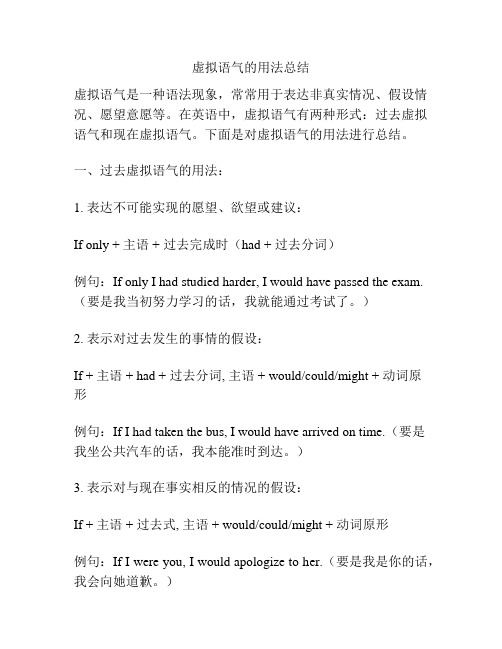
虚拟语气的用法总结虚拟语气是一种语法现象,常常用于表达非真实情况、假设情况、愿望意愿等。
在英语中,虚拟语气有两种形式:过去虚拟语气和现在虚拟语气。
下面是对虚拟语气的用法进行总结。
一、过去虚拟语气的用法:1. 表达不可能实现的愿望、欲望或建议:If only + 主语 + 过去完成时(had + 过去分词)例句:If only I had studied harder, I would have passed the exam.(要是我当初努力学习的话,我就能通过考试了。
)2. 表示对过去发生的事情的假设:If + 主语 + had + 过去分词, 主语 + would/could/might + 动词原形例句:If I had taken the bus, I would have arrived on time.(要是我坐公共汽车的话,我本能准时到达。
)3. 表示对与现在事实相反的情况的假设:If + 主语 + 过去式, 主语 + would/could/might + 动词原形例句:If I were you, I would apologize to her.(要是我是你的话,我会向她道歉。
)4. 表达对不可能实现的条件:If only + 过去式例句:If only I had a million dollars.(要是我有一百万美元该多好。
)二、现在虚拟语气的用法:1. 表达建议、命令等正式用法:表达建议:(should +动词原形/动词原形)例句:It's important (that) you should take some rest.(你应该休息一下,这很重要。
)表达命令:(应用“命令式”的虚拟形式)例句:It's vital (that) he be here on time.(他必须准时到达,这很重要。
)2. 表达愿望、要求、建议等陈述式的用法:It's time/It's high time + 过去式例句:It's time you went to bed.(你该去睡觉了,时间到了。
英语虚拟语气用法总结

英语虚拟语气用法总结1、表示与现在事实相反的情况:从句:主语+过去时主句:主语+should/would/could/might+doeg:1.If I were you,I would take an umbrella.如果我是你,我会带把伞.(事实:我不可能是你)2.If I knew his telephone number,I would tell you.如果我知道他的电话号码,我就会告诉你.(事实:不知道)2、表示与过去事实相反的情况从句:主语+had+done主句:主语+should/would/could/might+have doneeg:1. If I had got there earlier,I should/could have met her.如果我早到那儿,我就会见到她. (事实:去晚了)2.If he had taken my advice,he would not have made such a mistake.如果他听我的劝告的话,就不会犯这样的错误了.(事实:没有听我的话)3、表示对将来情况的主观推测从句:主句①if+主语+were to do :①主语+should/would/could/might+do②if+主语+did/were ②主语+should/would/could/might+do③if+主语+should+do ③主语+should/would/could/might+doeg:1.If he should come here tomorrow,I would talk to him.如果他明天来这儿的话,我就跟他谈谈.(事实:来的可能性很小)2.If there were a heavy snow next Sunday,we would not go skating.如果下周日下大雪,我们就不能去滑冰了.(事实:不知能否下雪)3.If she were to be here next Monday,I would tell her about the matter.如果她下周一来这儿的话,我就会告诉她这件事的始末.。
虚拟语气的使用

虚拟语气的使用虚拟语气是指用来表达与事实相反、与现实不符或未发生的情况的一种语气。
在中文中,虚拟语气主要通过词语的选择、句子结构的变化以及语气的表示来体现。
在英语中,虚拟语气则有特定的形式和用法。
虚拟语气在表达假设、愿望、建议、命令等语境中广泛使用。
本文将详细讨论虚拟语气的用法和相关例句。
一、虚拟语气的基本形式虚拟语气在英语中有多种形式,包括虚拟语气的一般现在时、过去时、过去将来时以及与现在事实相反、与过去事实相反的虚拟语气。
具体形式如下:1. 虚拟语气的一般现在时虚拟语气的一般现在时用于表示与现在事实相反的情况。
其构成为:主语 + "would/could/should/might" + 动词原形。
例句1:If I were rich, I would travel around the world.(如果我有钱,我将会环游世界。
)例句2:She suggested that her brother should study abroad.(她建议她的弟弟出国留学。
)2. 虚拟语气的过去时虚拟语气的过去时用于表示与过去事实相反的情况。
其构成为:主语 + "would/could/should/might" + have + 过去分词。
例句1:If I had known the truth, I would have made a different decision.(如果我当时知道真相,我会作出不同的决定。
)例句2:She wishes she could have attended the party last night.(她希望昨晚能参加派对。
)3. 虚拟语气的过去将来时虚拟语气的过去将来时用于表示与过去将来事实相反的情况。
其构成为:主语 + "would/could/should/might" + have + 过去分词。
英语虚拟语气的基本用法归纳(优秀9篇)
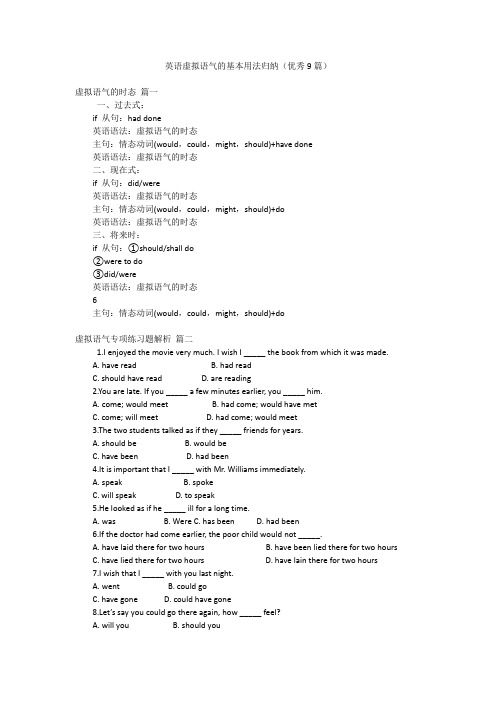
英语虚拟语气的基本用法归纳(优秀9篇)虚拟语气的时态篇一一、过去式:if 从句:had done英语语法:虚拟语气的时态主句:情态动词(would,could,might,should)+have done英语语法:虚拟语气的时态二、现在式:if 从句:did/were英语语法:虚拟语气的时态主句:情态动词(would,could,might,should)+do英语语法:虚拟语气的时态三、将来时:if 从句:①should/shall do②were to do③did/were英语语法:虚拟语气的时态6主句:情态动词(would,could,might,should)+do虚拟语气专项练习题解析篇二1.I enjoyed the movie very much. I wish I _____ the book from which it was made.A. have readB. had readC. should have readD. are reading2.You are late. If you _____ a few minutes earlier, you _____ him.A. come; would meetB. had come; would have metC. come; will meetD. had come; would meet3.The two students talked as if they _____ friends for years.A. should beB. would beC. have beenD. had been4.It is important that I _____ with Mr. Williams immediately.A. speakB. spokeC. will speakD. to speak5.He looked as if he _____ ill for a long time.A. wasB. WereC. has beenD. had been6.If the doctor had come earlier, the poor child would not _____.A. have laid there for two hoursB. have been lied there for two hoursC. have lied there for two hoursD. have lain there for two hours7.I wish that I _____ with you last night.A. wentB. could goC. have goneD. could have gone8.Let’s say you could go there again, how _____ feel?A. will youB. should youC. would youD. do you9.I can’t stand him. He always talks as though he _____ everything.A. knewB. knowsC. has knownD. had known10._____ the fog, we should have reached our school.A. Because ofB. In spite ofC. In case ofD. But for11.If you had told me in advance, I _____ him at the airport.A. would meetB. would had metC. would have metD. would have meet12.Mike can take his car apart and put it back together again. I certainly wish he_____ me how.A. teachesB. will teachC. has taughtD. would teach13.I would have told him the answer, had it been possible, but I _____ so busy then.A. had beenB. wereC. wasD. would be14.He’s working hard for fear that he _____.A. should fall behindB. fell behindC. may fall behindD. would fallen behind15.If it _____ another ten minutes, the game would have been called off.A. had rainedB. would have rainedC. have seenD. rained16.He suggested that they _____ use a trick instead of fighting.A. shouldB. wouldC. doD. had17.My father did not go to New York; the doctor suggested that he _____ there.A. not wentB. won’t goC. not goD. not to go18.I would have gone to the meeting if I _____ time.A. had hadB. have hadC. hadD. would have had19.Would you rather I _____ buying a new bike?A. decided againstB. will decide againstC. have decidedD. shall decide against20.You look so tired tonight. It is time you _____.A. go to sleepB. went to sleepC. go to bedD. went to bed21、—Why didn’t you buy a new car?—I would have bought one if I _____ enough money.A. hadB. have hadC. would haveD. had had22.If she could sew, _____.A. she make a dressB. she would have made a shirtC. she will make a shirtD. she would had made a coat23._____ today, he would get there by Friday.A. Would he leaveB. Was he leavingC. Were he to leaveD. If he leaves24.His doctor suggested that he _____ a short trip abroad.A. will takeB. would takeC. takeD. took25.The Bakers arrived last night. If they’d only let us know earlier,_____ at the station.A. we’d meet themB. we’ll meet themC. we’d have met themD. we’ve met them26.If I _____ you, I _____ more attention to English idioms and phrases.A. was; shall payB. am; will payC. would be; would payD. were; would pay27.We might have failed if you _____ us a helping hand.A. have not givenB. would not giveC. had not givenD. did not give28.The law requires that everyone _____ his car checked at least once a year.A. hasB. hadC. haveD. will have29.It is strange that he _____ so.A. would sayB. would speakC. should sayD. will speak30.Had I known her name, _____A. or does she know mine?B. and where does she live?C. she would be beautiful.D. I would have invited her to lunch.31.He has just arrived, but he talks as if he _____ all about that.A. knowB. knowsC. knownD. knew32.If I _____ the money, I would have bought a much bigger car.A. possessedB. ownedC. hadD. had had33.He was very busy yesterday; otherwise, he _____ to the meeting.A. would comeB. cameC. would have comeD. will come34.The librarian insists that John _____ no more books from the library before he returns all the books he has borrowed.A. will takeB. tookC. takeD. takes35.I left very early last night, but I wish I _____ so early.A. didn’t leaveB. hadn’t leftC. haven’t leftD. couldn’t leave36.I do not have a job. I would find one but I _____ no time.A. hadB. didn’t haveC. had hadD. have37.I wish that you _____ such a bad headache because I’m sure that you would have enjoyed the concert.A. hadn’tB. didn’t have hadC. hadn’t hadD. hadn’t have38.He insisted that we all _____ in his office at one o’clock.A. beB. to beC. would beD. shall be39.Helen couldn’t go to France after all. That’s too bad. I’m sure she would have enjoyed it if _____.A. she’s goneB. she’ll goC. she’d goneD. she’d go答案:1—5 BBDAD 6—10 DDCAD11—15 CDCAA 16—20 ACAAD21—25 DBCCC 26—30 DCCCD31—35 DDCCB 36—39 DCAC解析:1.wish后面用虚拟语气,表示与过去事实相反用过去完成时。
虚拟语气用法总结(完整)
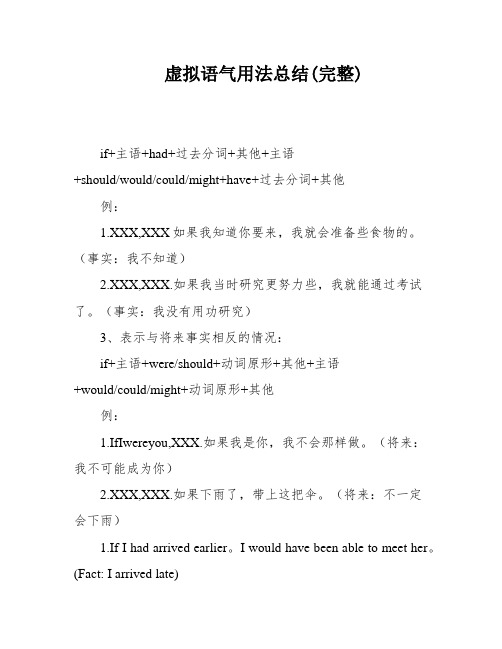
虚拟语气用法总结(完整)if+主语+had+过去分词+其他+主语+should/would/could/might+have+过去分词+其他例:1.XXX,XXX如果我知道你要来,我就会准备些食物的。
(事实:我不知道)2.XXX,XXX.如果我当时研究更努力些,我就能通过考试了。
(事实:我没有用功研究)3、表示与将来事实相反的情况:if+主语+were/should+动词原形+其他+主语+would/could/might+动词原形+其他例:1.IfIwereyou,XXX.如果我是你,我不会那样做。
(将来:我不可能成为你)2.XXX,XXX.如果下雨了,带上这把伞。
(将来:不一定会下雨)1.If I had arrived earlier。
I would have been able to meet her。
(Fact: I arrived late)2.If he had XXX my advice。
he would not have made such a mistake。
(Fact: He didn't listen to me)3.If he were to come here tomorrow。
I would talk to him。
(Fact: It's XXX he will come)In expressing ns。
orders。
requests。
etc。
the subjunctive mood is often used in the object clause。
with the verb in the form of "should + infinitive," which can be omitted.Other uses of XXX:1.The subjunctive mood is used in the object clause after "wish" to express a XXX fact。
英语中虚拟语气用法总结
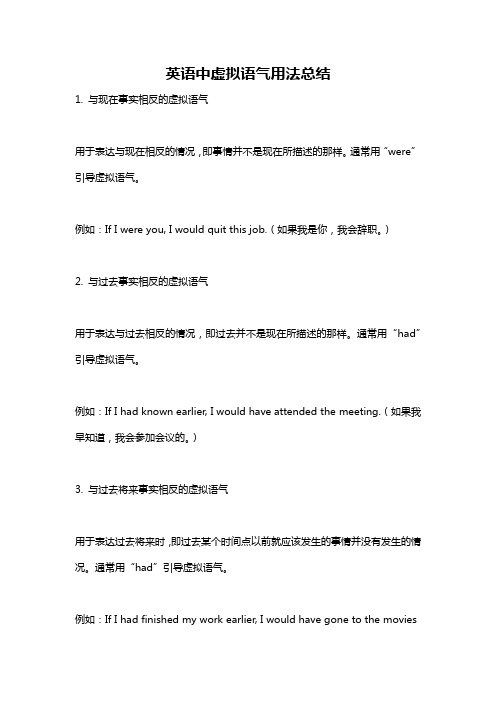
英语中虚拟语气用法总结1. 与现在事实相反的虚拟语气用于表达与现在相反的情况,即事情并不是现在所描述的那样。
通常用“were”引导虚拟语气。
例如:If I were you, I would quit this job.(如果我是你,我会辞职。
)2. 与过去事实相反的虚拟语气用于表达与过去相反的情况,即过去并不是现在所描述的那样。
通常用“had”引导虚拟语气。
例如:If I had known earlier, I would have attended the meeting.(如果我早知道,我会参加会议的。
)3. 与过去将来事实相反的虚拟语气用于表达过去将来时,即过去某个时间点以前就应该发生的事情并没有发生的情况。
通常用“had”引导虚拟语气。
例如:If I had finished my work earlier, I would have gone to the movieswith my friends.(如果我早点完成工作,我会和朋友去看电影的。
)4. 与现在将来可能性相反的虚拟语气用于表达现在将来的可能性,即可能会发生但不太可能的情况。
通常用“should”或“were to”引导虚拟语气。
例如:If I were to win the lottery, I would travel around the world.(如果我中了彩票,我会周游世界的。
)5. 与过去将来可能性相反的虚拟语气用于表达过去将来的可能性,即曾经可能会发生但最终却没发生的情况。
通常用“should”或“were to”引导虚拟语气。
例如:If I should fail the exam, I would have to retake it in three months.(如果我考试不及格,我就得三个月后再次参加考试。
)。
虚拟语气用法总结
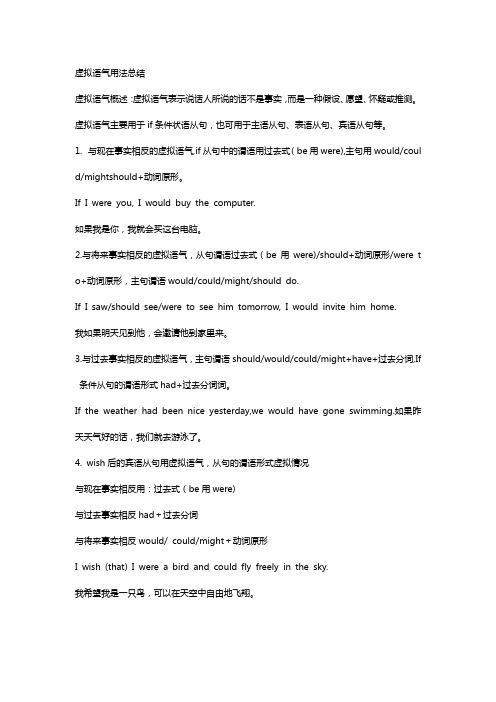
虚拟语气用法总结虚拟语气概述:虚拟语气表示说话人所说的话不是事实,而是一种假设、愿望、怀疑或推测。
虚拟语气主要用于if条件状语从句,也可用于主语从句、表语从句、宾语从句等。
1.与现在事实相反的虚拟语气,if从句中的谓语用过去式(be用were),主句用would/coul d/mightshould+动词原形。
If I were you, I would buy the computer.如果我是你,我就会买这台电脑。
2.与将来事实相反的虚拟语气,从句谓语过去式(be用were)/should+动词原形/were t o+动词原形,主句谓语would/could/might/should do.If I saw/should see/were to see him tomorrow, I would invite him home.我如果明天见到他,会邀请他到家里来。
3.与过去事实相反的虚拟语气,主句谓语should/would/could/might+have+过去分词,If 条件从句的谓语形式had+过去分词词。
If the weather had been nice yesterday,we would have gone swimming.如果昨天天气好的话,我们就去游泳了。
4. wish后的宾语从句用虚拟语气,从句的谓语形式虚拟情况与现在事实相反用:过去式(be用were)与过去事实相反had+过去分词与将来事实相反would/ could/might+动词原形I wish (that) I were a bird and could fly freely in the sky.我希望我是一只鸟,可以在天空中自由地飞翔。
虚拟语气的用法和常见句型
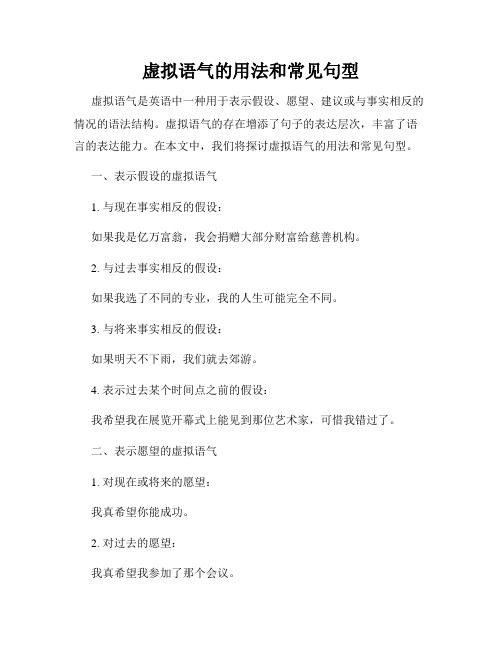
虚拟语气的用法和常见句型虚拟语气是英语中一种用于表示假设、愿望、建议或与事实相反的情况的语法结构。
虚拟语气的存在增添了句子的表达层次,丰富了语言的表达能力。
在本文中,我们将探讨虚拟语气的用法和常见句型。
一、表示假设的虚拟语气1. 与现在事实相反的假设:如果我是亿万富翁,我会捐赠大部分财富给慈善机构。
2. 与过去事实相反的假设:如果我选了不同的专业,我的人生可能完全不同。
3. 与将来事实相反的假设:如果明天不下雨,我们就去郊游。
4. 表示过去某个时间点之前的假设:我希望我在展览开幕式上能见到那位艺术家,可惜我错过了。
二、表示愿望的虚拟语气1. 对现在或将来的愿望:我真希望你能成功。
2. 对过去的愿望:我真希望我参加了那个会议。
三、表示建议的虚拟语气1. 建议:他建议我尽早去见医生。
2. 要求:老师要求我们每天完成作业。
四、常见的虚拟语气句型1. If only... (要是...该多好)If only I were younger, I could join the marathon.(要是我年轻些就好了,我就可以参加马拉松了。
)2. It's time... (是时候...了)It's time we started planning for our summer vacation.(是时候我们开始为暑假计划了。
)3. I wish... (我希望...)I wish I had more time to spend with my family.(我希望我有更多时间陪伴家人。
)4. Suppose... (假设...)Suppose it rains tomorrow, what should we do?(假设明天下雨了,我们该怎么办?)5. If it were not for... (要不是因为...)If it were not for your help, I wouldn't have finished the project on time.(要不是因为你的帮助,我不会按时完成这个项目。
英语虚拟语气的用法

英语虚拟语气的用法
英语中的虚拟语气主要用来表示与事实相反的假设、愿望、建议、命令等。
以下是虚拟语气的用法:
1. 假设:
- If I were rich, I would travel around the world.(如果我富有,我会环游世界)
- If she had studied harder, she would have passed the exam.
(如果她学得更努力,她就能通过考试了)
2. 愿望:
- I wish I were taller.(我希望我能更高些)
- I wish I had a bigger house.(我希望我有一所更大的房子)
3. 建议:
- I suggest that he go to the doctor.(我建议他去看医生)
- She recommended that I take a cooking class.(她建议我去上
厨艺课)
4. 命令:
- I insist that you be on time.(我坚决要求你准时)
- The teacher demanded that the students do their homework.
(老师要求学生们做作业)
需要注意的是,虚拟语气的形式与实际情况相反,常以过去式或"were"代替"was"出现,当使用第三人称时,动词要加"s"。
此外,有些情况下,虚拟语气也可通过使用"should"或"would"来表达。
英语虚拟语气的用法归纳

英语虚拟语气的用法归纳英语虚拟语气是一种语法现象,用来表达与事实相反、假设、愿望、建议等与现实情况不符的情态。
以下是英语虚拟语气的用法归纳:1. 虚拟条件句:a. Type 1:表示可能实现的条件句,使用"if + 一般过去时",主句使用"would/ could/ should/ might + 动词原形"。
示例:If I had money, I would buy a car.(如果我有钱,我会买车。
)b. Type 2:表示不可能实现的条件句,使用"if + 过去式",主句使用"would/ could/ should/ might + 动词原形"。
示例:If I were you, I would quit that job.(如果我是你,我会辞职。
)c. Type 3:表示过去未实现的条件句,使用"if + 过去完成时",主句使用"would/ could/ should/ might + have + 过去分词"。
示例:If I had studied harder, I would have passed the exam.(如果我学得更努力,我就能通过考试。
)2. 虚拟表达愿望或建议:a. 表达愿望时,使用"wish + 主语 + 过去式"。
示例:I wish I were taller.(但实际上我不高。
)b. 表达建议、要求或命令时,使用"would/ could/ might + 动词原形"。
示例:I suggest that you should study harder.(我建议你应该学习更努力。
)3. 虚拟表达假设:a. 使用"as if/ though"引导的从句中,使用虚拟语气,表示与事实相反。
虚拟语气的用法与情况总结

虚拟语气的用法与情况总结虚拟语气是一种用来表达非事实的语气,它主要用于表示说话者的愿望、建议、推测、假设等情况。
在中文中,虚拟语气通常通过动词形式的变化或者使用特定的语气词来表达。
在下文中,将对虚拟语气的主要用法进行总结。
一、表示愿望虚拟语气可用来表达说话者的愿望或希望,常见的情况如下:1. 希望某事发生:- If only + 主语 + 过去式- I wish/If only + 主语 + would/could + 动词原形例如:- If only I had more free time to relax.- I wish I could visit Paris someday.2. 表示对过去事实的悔恨:- I wish/If only + 主语 + had + 过去分词例如:- I wish I had studied harder for the exam.二、表示建议或命令虚拟语气还可以用来表示建议或命令的情况,常见的用法如下:1. 建议:- (I suggest/recommend) + (that) + 主语 + (should) + 动词原形例如:- I suggest that you should take a break and relax.2. 命令:- (I demand/insist) + (that) + 主语 + (should) + 动词原形例如:- I demand that he should apologize for his behavior.三、表示假设当我们讨论假设、虚构或与事实相反的情况时,虚拟语气可用来表达,常见的情况如下:1. 虚拟条件句:- If + 主语 + 过去式,主语 + would/could/might + 动词原形例如:- If I were rich, I would travel the world.2. 虚拟假设:- If + 主语 + were,主语 + would/could/might + 动词原形例如:- If I were you, I would apologize to her.四、表示推测或假设除了表示真实的假设,虚拟语气还可以用来表示推测或假设的情况,常见的用法如下:1. 推测:- It is (high/about) time + 主语 + (过去式)例如:- It is high time you went to bed.2. 假设:- Suppose + 主语 + (过去式)例如:- Suppose she didn't arrive on time, what would you do?综上所述,虚拟语气被广泛应用于表达愿望、建议、推测和假设等情况。
英语中的虚拟语气的用法
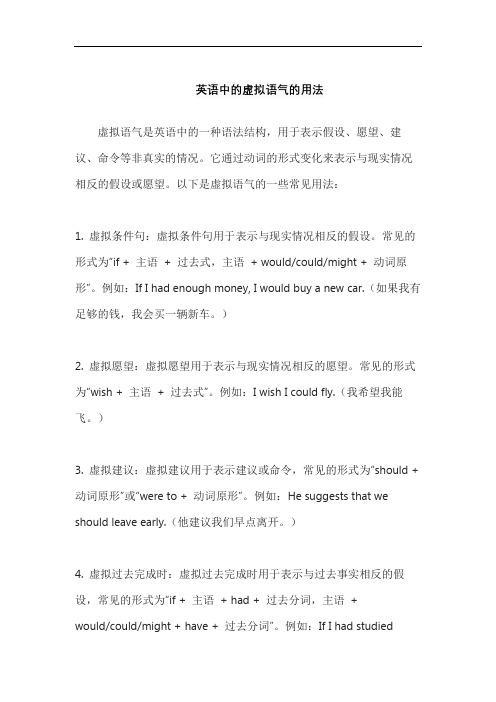
英语中的虚拟语气的用法虚拟语气是英语中的一种语法结构,用于表示假设、愿望、建议、命令等非真实的情况。
它通过动词的形式变化来表示与现实情况相反的假设或愿望。
以下是虚拟语气的一些常见用法:1. 虚拟条件句:虚拟条件句用于表示与现实情况相反的假设。
常见的形式为“if + 主语+ 过去式,主语+ would/could/might + 动词原形”。
例如:If I had enough money, I would buy a new car.(如果我有足够的钱,我会买一辆新车。
)2. 虚拟愿望:虚拟愿望用于表示与现实情况相反的愿望。
常见的形式为“wish + 主语+ 过去式”。
例如:I wish I could fly.(我希望我能飞。
)3. 虚拟建议:虚拟建议用于表示建议或命令,常见的形式为“should + 动词原形”或“were to + 动词原形”。
例如:He suggests that we should leave early.(他建议我们早点离开。
)4. 虚拟过去完成时:虚拟过去完成时用于表示与过去事实相反的假设,常见的形式为“if + 主语+ had + 过去分词,主语+would/could/might + have + 过去分词”。
例如:If I had studiedharder, I could have passed the exam.(如果我当时努力学习,我就能通过考试了。
)5. 虚拟语气在宾语从句中的用法:在某些动词后的宾语从句中,需要使用虚拟语气。
常见的动词包括“suggest”、“order”、“demand”等。
例如:He demanded that we should leave immediately.(他要求我们立即离开。
)虚拟语气在英语中有多种用法,需要根据具体语境和句子结构来选择适当的形式。
掌握虚拟语气的用法对于提高英语语法水平和表达能力至关重要。
虚拟语气的运用

虚拟语气的运用虚拟语气在各种从句的应用主语从句的虚拟1. It is + adj. + that sb. (should) do常见的形容词有:necessary, important, strange, naturalIt's important that he take my advice.2. It is + n. + that sb. (should) do常见的名词有:a pity, a shame, no wonder, one's wishIt's a pity that he be so silly.3. It is + done + that sb. (should) do常见的过去分词有:suggested, advised, demanded, requested, required, asked, ordered,proposed, decided, desired, insisted等。
It's requested that she go home as soon as possible.宾语从句的虚拟1. 表命令,表建议,表要求的动词,后接宾语从句虚拟。
虚拟的构成为(should) do。
I advise that he stay at home.2. wish后接从句,虚拟的构成是往过去推一个时态。
I wish I had watched the football match last night.注意以下几组词或短语用于虚拟语气中。
1. as if, as thoughHe speaks English as if he were a native speaker.2. otherwise, but, even thoughHe was ill. Otherwise he would have been there.3. with, without, but forWithout your help, I would have died two years ago.But for your help, I would have died two years ago.4. would rather I'd rather you told me yourself.5. It's time thatIt's time that you went to bed.It's time that you should go to bed.表语从句中的虚拟在表语从句中,表示间接的命令,要求、请求、建议、决定等,主句中的主语通常是suggestion, proposal, request, orders, idea等。
英语中的虚拟语气用法总结
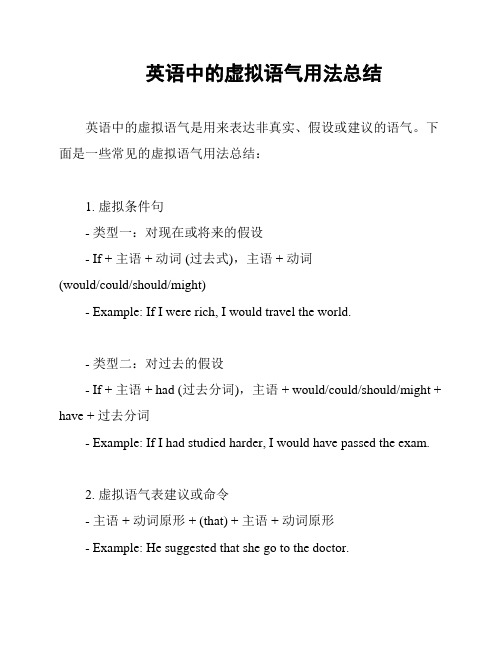
英语中的虚拟语气用法总结英语中的虚拟语气是用来表达非真实、假设或建议的语气。
下面是一些常见的虚拟语气用法总结:1. 虚拟条件句- 类型一:对现在或将来的假设- If + 主语 + 动词 (过去式),主语 + 动词(would/could/should/might)- Example: If I were rich, I would travel the world.- 类型二:对过去的假设- If + 主语 + had (过去分词),主语 + would/could/should/might + have + 过去分词- Example: If I had studied harder, I would have passed the exam.2. 虚拟语气表建议或命令- 主语 + 动词原形 + (that) + 主语 + 动词原形- Example: He suggested that she go to the doctor.3. 虚拟语气表愿望- 类型一:对现在或将来的愿望- 主语 + wish/es + 主语 + 动词过去式- Example: I wish I were taller.- 类型二:对过去的愿望- 主语 + wish/es + 主语 + 过去完成时- Example: I wish I had studied more.4. 虚拟语气表态度或建议- It is (high) time + 主语 + 过去式- Example: It is time that she left.- 主语 + would rather + 主语 + (did) + 动词原形- Example: She would rather he didn't smoke.这些是英语中常用的虚拟语气用法总结。
希望对您有帮助!。
虚拟语气用法总结(超好_原创)

虚拟语气概念:谓语v用不同的形式表示说话人的不同意图,这种形式称为语气。
语气分三种:1.陈述语气:用来陈述一个事实,或提出一种看法,有肯定、否定、疑问、感叹等形式。
He is late for class. What fun!He is not interested in classical music.2.祈使语气:用来表示请求、邀请、命令、警告或劝告等(动词常用原形)Don’t be late!3.虚拟语气:表示说话人所说的不是事实,而是一种假设、愿望、怀疑或推测。
一、虚拟语气在if非真实条件句中虚拟条件从句(If) 主句与现在事实相反的假设主语+did/were 主语+should / would/could / might + do与过去事实相反的假设主语+ had done 主语+ should / would/ could / might +have done与将来事实相反的假设主语+1.did主语+should / would/could / might + do2.should do3.were to do1.如果我是你,我会接受他的建议。
If I were you, I would accept his advice.2.如果明天下雨,我会待在家里。
If it rained/should rain/were to rain tomorrow, I would stay at home.3.如果你以前好好学习,你会通过考试的。
If you had studied hard before, you would have passed the exam.You didn’t let me drive. If we ______ in turn, you ______ so tired.A.drove; didn’t getB.drove; wouldn’t getC.were driving; wouldn’t gethad driven; wouldn’t have got________ it rain tomorrow, we would have to put off the visit to the Yang Pu Bridge.A.Were ShouldC.WouldD. Will注意:1.错综时间虚拟语气当从句主句所表示的行为所发生的时间不一致时,动词的形式要根据它所表示的时间作出相应的调整。
